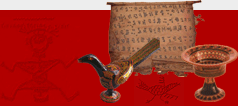|
论彝族的荣辱观
Yi Concepts of Honor and Shame
罗家修 Luo Jiaxiu
四川西昌美姑干休所
【摘要】彝族是一个文明古老的民族,她有许多优秀的传统文化和传统美德。她的传统文化和传统美德中包含了一整套别具特点的荣辱观。而荣辱观的正确与否,关系到该民族的兴衰成败。正确的荣辱观是一个民族的凝聚力之所在。彝族有许多优良的荣辱观。彝族认为,人和动物的最根本的区别在于:“人知道光荣与耻辱,动物则不知道光荣与耻辱。”所以彝族从幼儿时就开始进行荣辱观的教育,使每一个彝人从小就懂得什么是光荣,什么是耻辱。从而树立正确的荣辱观。本文以三十余条荣辱观来阐述彝族的荣辱观。这里仅举一条为例:知耻为荣,无耻为耻。彝族尔比(格言、谚语)说:“人贵知耻。”“无父可以生存,无母可以生存,无耻难生存。”可见彝族把耻提高到了何等重要的位置。这一条是彝族荣辱观的核心、精华。彝族认为,人活在世上,心须知耻,不说对自己,对祖先、对家族、对亲友不光彩的话;不做有损自己、家族、祖先和亲友荣誉的事。彝族谚语说:“人活图个名,虎死留张皮。”、“耻辱地活着,不如光彩地死去。”彝族还认为做坏事、做不光彩的事、缺德的事都是不知耻所致。
关键词: 彝族 荣辱观
Abstract
Yi ethnic group is an old and civilized one, who has many
excellent traditional culture and virtues, among which a
complete theory of concepts of honor and shame is contained.
Whether its concepts of honor and shame right or not is
a matter concerning whether an ethnic group would be prevailing
or not. A right sense of honor and shame provides the coherence
power to an ethnic group. Yi ethnic group has a number of
outstanding concepts of honor and shame. The Yi people believe
that the basic difference between human beings and animals
is, “human beings have sense of honor, yet animals do not.”
So Yi people are educated in the sense of honor from the
time they are children. Everyone needs to know what is honor
and what is disgrace, so as to set up correct concepts of
honor and shame. This paper employs more than 30 proverbs
to describe the Yi concepts of honor and shame. For example,
“people who know what disgrace is are honorable, people
who do not are disgraceful.” A Yi proverb says, “People
should know what disgrace is.” “People can live without
parents, but they can not live without sense of honor.”
All of this shows the high position of Yi people’s conceptualization
of honor and shame. And it is also the core and essence
of concepts of honor and shame. They think, living in the
world, people should know what to do and what not to do,
without saying words hurting themselves, their families,
their relatives; without doing anything damaging the honor
of themselves, their families, ancestors and relatives.
As an old Yi saying goes, “people should live for a graceful
fame; even dying, tigers should leave their royal skins.”
“Living in disgrace is worse than dying in honor.” Yi people
also tend to believe that it is because of ignorance of
honor that people do bad deeds.
Keywords: Yi people─concepts of honor and shame
作者简介:
罗家修,男,彝族,彝名罗洪大英阿谦,四川凉山喜德人,生于1926年,现年79岁。1949年毕业于黄埔军校第22期。1950年参加革命,毕业于中央民族学院军政干部班。
历任中央民族学院讲师、普雄县副县长、四川民族出版社彝文编译室副主任、凉山州语委副主任、美姑县副县长等职。1986年退休。本人长期从事彝族语言文字、民族学、民族古文字、民族科技史的研究。现在是中国民族学学会、中国民族语言学会、中国民族古文字研究会、中国少数民族科技史研究会等学会会员,凉山彝族文史研究会顾问。主要著作有:《古今彝历考》、有一百一十余万字的《彝族历典》(每天含八个项目的一百年彝族历书)、《凉山彝族谱系》(合作执笔)、《彝族格言》(合作执笔)、《玛牧特依》(古籍整理注释)、译著《返老还童的扇子》等三十余部,论文三十余篇。参加过在国内开的四次国际学术会议,并在大会上宣读论文,论文都收入《论文集》出版。
About the Author:
Luo Jiaxiu (Lohxo Dayi Aqie), male, Yi ethnic,
comes from Xide County, Liangshan, Sichuan Province. He
was born in 1926, and is 79 now. He graduated from Huangpu
Military Academy in 1949 as one of the 22nd term of graduates.
In 1950, he joined in the Chinese revolution, graduating
from the director training course in Central Institute for
Nationalities (now CUN). He used to work as lecturer of
CIN, vice head of Puxiong County, vice director of Yi-language
Translating Office of Sichuan Ethnic Press, vice director
of Liangshan Committee for Ethnic languages, vice head of
Meigu County, etc. He retired in 1986. He has been studying
Yi language, ancient books, and the history of ethnic technologic
development. Now he has membership in China Ethnology Society,
China Ethnolinguistcs Association, China Ethnic Ancient
Literacy Society, and China Association for Ethnic Technologic
History. He acts as consultant of Liangshan Society of Yi
Literature and History. His major works includes “A Textual
Research of Ancient and Contemporary Calendar System of
Yi Ethnic Group”, “A Calendar Handbook of Yi Ethnic Group”,
“Genealogies of Liangshan Yi People” (coauthored), “Yi Mottos
and Maxims” (coauthored), “Hmamu Teyy”, and “A Rejuvenated
Fan” (translated). He attended and made his presentations
at four international conferences held in China, and those
papers have been collected in paper volumes.
|





